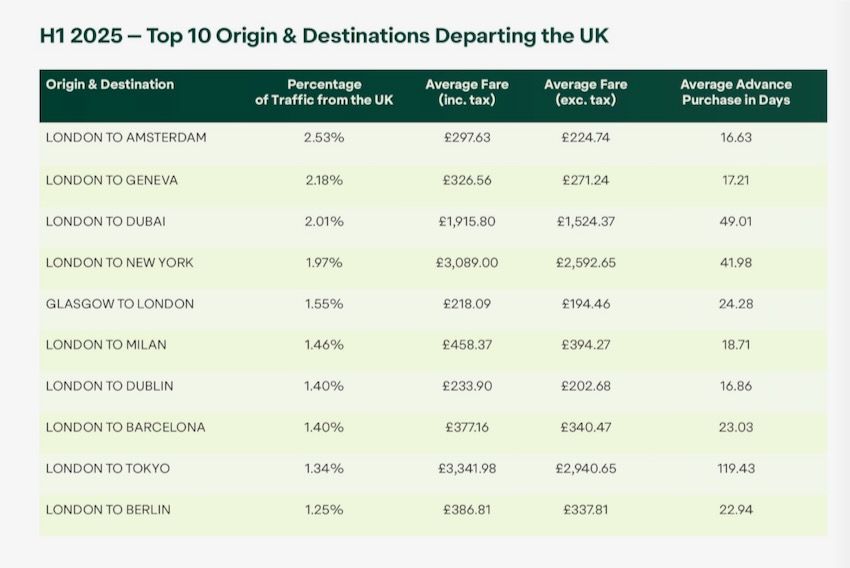Business travel volumes between the UK and US fell by 25.67 per cent in the year*s first half, according to Travelogix booking data, in a period marred by macroeconomic uncertainty, trade frictions and rising costs.
Sign up for more...
News ? analysis ? podcasts ? reports
I accept the Terms and Conditions and Privacy Policy.
According to the company*s latest Global Business Travel Review, produced in collaboration with the Advantage Travel Partnership, spend associated with US travel is down only 7 per cent, suggesting senior leaders travelling in premium cabins, continue to travel. In fact, the average value associated with these bookings has increased 25 per cent year on year, according to Travelogix.
The report, which analyses 555,138 transactions made between 01 January and 30 June 2025 with a total value of ?341.96 million, also noted an uptick in short-haul international travel alongside a ※significant§ drop in the number of international trips, particularly to the US.
The top 10 destinations booked from the UK in H1 2025 signal a shift towards more regional travel (see below), with booking volumes between London and both Amsterdam and Geneva, and London and Dubai now sitting in the top three positions, respectively. By comparison, the top three routes with the greatest booking volume in 2024 were London to Dubai, London to New York and London to Amsterdam.
 Credit: Travelogix / Advantage Travel Partnership
Credit: Travelogix / Advantage Travel Partnership
Despite the swing towards regional business travel, spend across the top 10 destinations decreased by 3.9 per cent year on year and total booking volumes dropped by nearly 3 per cent, according to the report.
Across all destinations, the report noted a 4.92 per cent reduction in spend and a 12.35 per cent drop in volume, suggesting the market is ※cooling§. Advance purchase metrics appear to support this view as average advance purchase time in H1 2025 decreased by 9.3 per cent compared to the same period last year, falling to 36.66 days from 40.42 days in 2024.
For US routes specifically, advance purchase fell by nearly seven days, indicating shorter planning windows for travel and UK businesses approaching transatlantic travel with more caution.
The report also highlighted considerable hotel leakage among UK-based corporates. From a total of 456,121 bookings identified as eligible for overnight stays among the H1 dataset, only 69,993 had an associated hotel booking 每 suggesting only 15.35 per cent of hotel bookings were made via approval channels. This equates to an estimated 1.25 million &leaked* bed nights, a missed revenue opportunity of approximately ?254 million and up to ?25.4 million in lost commissions for TMCs, according to the report. ?
Additionally, the report examined the air to rail modal shift on viable international routes, with a ※very nominal§ change in bookings compared to 2024.
On routes from the UK to Amsterdam, Brussels and Paris, rail accounted for 42.74 per cent of all bookings, a slight decrease from 43.61 per cent in H1 2024, however, the volume of total bookings on these eligible routes has grown by 7.94 per cent year on year, reflecting healthy business activity across the region. However, air travel had maintained its dominance in terms of modal preference on routes where rail is a viable option, with 57.26 per cent of travellers opting to fly.
From a cost perspective, air fares on all three routes from London to Amsterdam, Brussels and Paris have increased year on year, while the cost of rail tickets have either declined or remained the same.
Despite the cost and carbon savings, rail bookings still lag behind air, which points to ongoing issues surrounding rail content fragmentation, as well as factors such as scheduling, convenience and traveller preferences.
Meanwhile, UK domestic travel has seen a ※minimal§ modal shift from air to rail, particularly between London and hubs such as Manchester, Glasgow, Edinburgh, Aberdeen and Inverness. Rail accounted for 37.64 per cent of all bookings on these routes in H1 2025, up from 36.86 per cent in 2024. However, total booking volumes across these routes have declined by 15.25 per cent year on year, equating to a 16.3 per cent drop in air bookings and a 13.46 per cent fall in rail.
In terms of online adoption, only 21 per cent of bookings were made via self-serve tools, with offline bookings accounting for 79 per cent of all bookings and 85.4 per cent of overall travel spend.